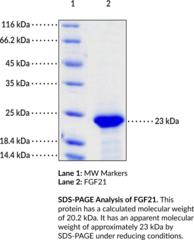Territorial Availability: Available through Bertin Technologies only in France
- Correlated keywords
- Escherichia UNQ3115 PRO10196 FGF-21 FGFR-1c FGFR2c FGFR3c FGFR4
- Product Overview:
Fibroblast growth factor 21 (FGF21) is a hepatokine and member of the endocrine subfamily of FGFs with roles in energy homeostasis, insulin sensitivity, and metabolic regulation.{53710,53711} Mature FGF21 is a 181-amino acid peptide composed of an N-terminal FGFR binding site, a conserved 120-amino acid core, and a C-terminal sequence that facilitates binding to the klotho beta (KLB) co-receptors.{53711} It is derived from a 209-amino acid protein that contains an additional 28-amino acid hydrophobic signaling peptide that drives constitutive secretion. FGF21 is primarily expressed in the liver but is also synthesized in white adipose tissue, skeletal muscle, pancreas, the digestive tract, and cardiac muscle.{53710,53711} It forms a complex with KLB and FGFR1c, -2c, -3c, or -4 to induce FGFR dimerization and signaling.{53710} Liver levels of FGF21 are increased in a mouse model of non-alcoholic fatty liver disease (NAFLD) induced by a methionine- and choline-deficient diet, and knockdown of Fgf21 increases hepatic triglyceride accumulation and fibrosis in mice. Exogenous administration of FGF21 induces weight loss, improves glucose tolerance, and increases the browning of white adipose tissue in a mouse model of diet-induced obesity. Administration of FGF21 also reduces ad libitum alcohol consumption in mice, and plasma levels of FGF21 are increased in humans following acute alcohol ingestion.{53712} Cayman’s FGF21 (human, recombinant) protein can be used for Western blot and cell-based assay applications. This protein is mature FGF21 that consists of 188 amino acids and has a calculated molecular weight of 20.2 kDa. By SDS-PAGE, under reducing conditions, the protein migrates at approximately 23 kDa.
Cayman Chemical’s mission is to help make research possible by supplying scientists worldwide with the basic research tools necessary for advancing human and animal health. Our utmost commitment to healthcare researchers is to offer the highest quality products with an affordable pricing policy.
Our scientists are experts in the synthesis, purification, and characterization of biochemicals ranging from small drug-like heterocycles to complex biolipids, fatty acids, and many others. We are also highly skilled in all aspects of assay and antibody development, protein expression, crystallization, and structure determination.
Over the past thirty years, Cayman developed a deep knowledge base in lipid biochemistry, including research involving the arachidonic acid cascade, inositol phosphates, and cannabinoids. This knowledge enabled the production of reagents of exceptional quality for cancer, oxidative injury, epigenetics, neuroscience, inflammation, metabolism, and many additional lines of research.
Our organic and analytical chemists specialize in the rapid development of manufacturing processes and analytical methods to carry out clinical and commercial GMP-API production. Pre-clinical drug discovery efforts are currently underway in the areas of bone restoration and repair, muscular dystrophy, oncology, and inflammation. A separate group of Ph.D.-level scientists are dedicated to offering Hit-to-Lead Discovery and Profiling Services for epigenetic targets. Our knowledgeable chemists can be contracted to perform complete sample analysis for analytes measured by the majority of our assays. We also offer a wide range of analytical services using LC-MS/MS, HPLC, GC, and many other techniques.
Accreditations
ISO/IEC 17025:2005
ISO Guide 34:2009
Cayman is a leader in the field of emerging drugs of abuse, providing high-purity Schedule I-V Controlled Substances to federally-licensed laboratories and qualified academic research institutions for forensic analyses. We are certified by ACLASS Accreditation Services with dual accreditation to ISO/IEC 17025:2005 and ISO Guide 34:2009.





